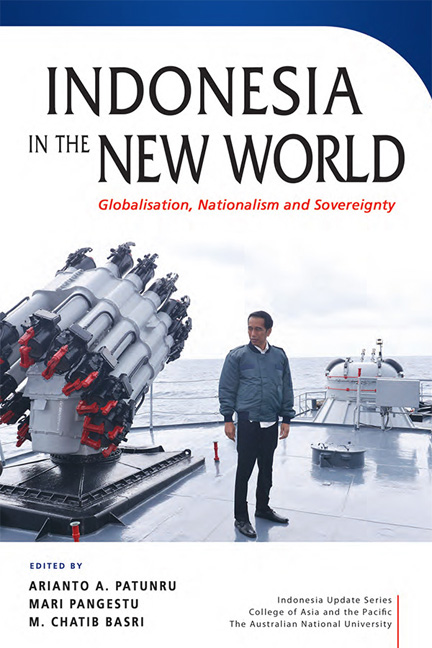Book contents
- Frontmatter
- Contents
- Tables
- Figures
- Contributor
- Acknowledgments
- Glossary
- 1 Challenges for Indonesia in the new world
- PART 1 Globalisation, Nationalism and Sovereignty: the Indonesian Experience
- PART 2 Nationalism in Practice
- PART 3 Impact of and Response to Globalisation
- PART 4 The Human Face of Globalisation
- PART 5 Navigating The New Globalisation
- 14 Indonesia and the global economy: missed opportunities?
- 15 International cooperation and the management of globalisation: the Indonesian experience
- Index
- INDONESIA UPDATE SERIES
14 - Indonesia and the global economy: missed opportunities?
from PART 5 - Navigating The New Globalisation
Published online by Cambridge University Press: 08 June 2019
- Frontmatter
- Contents
- Tables
- Figures
- Contributor
- Acknowledgments
- Glossary
- 1 Challenges for Indonesia in the new world
- PART 1 Globalisation, Nationalism and Sovereignty: the Indonesian Experience
- PART 2 Nationalism in Practice
- PART 3 Impact of and Response to Globalisation
- PART 4 The Human Face of Globalisation
- PART 5 Navigating The New Globalisation
- 14 Indonesia and the global economy: missed opportunities?
- 15 International cooperation and the management of globalisation: the Indonesian experience
- Index
- INDONESIA UPDATE SERIES
Summary
‘Indonesia was born a free trader yet is consistently reluctant to accept globalization.’
(Basri 2012: 46)More open economies generally grow faster than less open economies. But openness needs to be managed. That is, to participate in the global economy, countries need not only to open their economies to trade, invest-ment and technology, but also to make supply-side investments to ensure that the benefits of openness are widely distributed. These investments include making sure that the country's population is equipped with the skills to take advantage of global opportunities, that there are social safety nets in place to manage the volatility that is inevitably associated with globalisation, and that the benefits are spatially dispersed.
Indonesia is an excellent laboratory for exploring these issues. After progressively disengaging from the global economy during the first two decades of independence, Indonesia has created a policy regime that has been broadly open since 1966. There were major and successful reform episodes in the late 1960s and the first half of the 1980s, and the economy and polity recovered surprisingly quickly from the deep economic and political crises of 1997–98. But the quotation above captures the central theme of this chapter: Indonesia continues to experience widespread ambivalence towards globalisation, and, as a result, the country is miss¬ing out on some of the opportunities available to more open economies.
In this chapter, we illustrate these issues by examining the links between Indonesia's policy environment and its export performance. In particular, as a case study we focus on the three most important footloose manufactured exports for most developing economies: garments, foot¬wear and electronics.
INDONESIA AND GLOBALISATION
An overview
It is a well-established empirical and theoretical proposition that, in times of growing world trade, more open economies generally grow faster than less open ones (Bhagwati 2004). Openness has also been central to East Asian economic success. All the high-growth East Asian economies adopted variants of the export-oriented development strategy, albeit with considerable variation from free-trade Singapore to the heavily managed Korean model of export orientation (Perkins 2013). At least until recently, these economies were able to achieve dramatic export success, in the context of a benign and increasingly open global economy in which the principle of multilateralism by and large held sway.
- Type
- Chapter
- Information
- Indonesia in the New WorldGlobalisation, Nationalism and Sovereignty, pp. 267 - 293Publisher: ISEAS–Yusof Ishak InstitutePrint publication year: 2018



